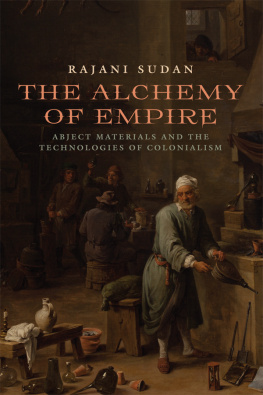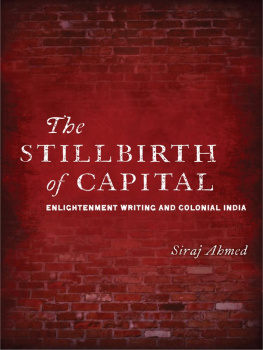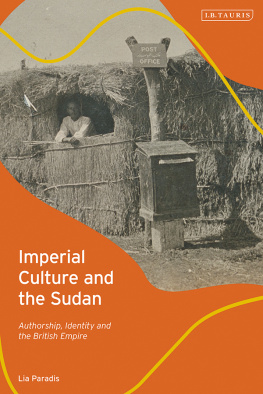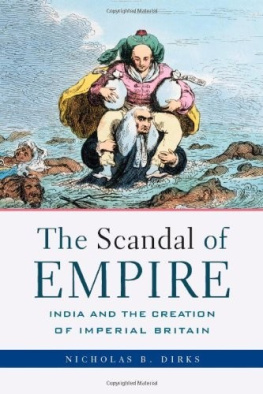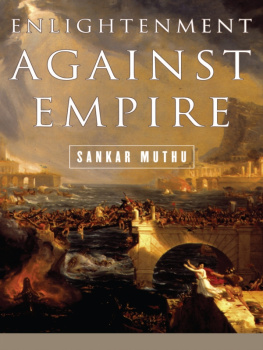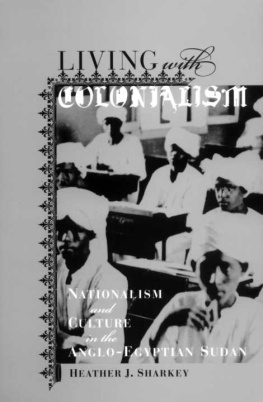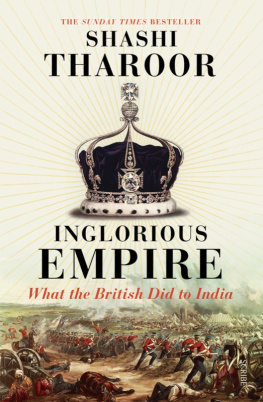Copyright 2016 Fordham University Press
All rights reserved. No part of this publication may be reproduced, stored in a retrieval system, or transmitted in any form or by any meanselectronic, mechanical, photocopy, recording, or any otherexcept for brief quotations in printed reviews, without the prior permission of the publisher.
Fordham University Press has no responsibility for the persistence or accuracy of URLs for external or third-party Internet websites referred to in this publication and does not guarantee that any content on such websites is, or will remain, accurate or appropriate.
Fordham University Press also publishes its books in a variety of electronic formats. Some content that appears in print may not be available in electronic books.
Visit us online at www.fordhampress.com.
Library of Congress Cataloging-in-Publication Data
Names: Sudan, Rajani.
Title: The alchemy of empire : abject materials and the technologies of colonialism / Rajani Sudan.
Description: New York : Fordham University Press, 2016. | Includes bibliographical references and index.
Identifiers: LCCN 2015042059 (print) | LCCN 2015046367 (ebook) | ISBN 9780823270675 (hardback) | ISBN 9780823270682 (paper) | ISBN 9780823270699 (ePub)
Subjects: LCSH: Technology transferHistory18th century. | EuropeCivilizationOriental influencesHistory18th century. | Enlightenment. | Technology in literature. | ImperialismHistory18th century. | Great BritainColoniesHistory18th century. | BISAC: LITERARY CRITICISM / European / English, Irish, Scottish, Welsh. | HISTORY / Social History.
Classification: LCC T174.3 .S79 2016 (print) | LCC T174.3 (ebook) | DDC 338.9/26dc23
LC record available at http://lccn.loc.gov/2015042059
Printed in the United States of America
18 17 16 5 4 3 2 1
First edition
Under the connecting feeling of tropical heat and vertical sun-lights, I brought together all creatures, birds, beasts, reptiles, all trees and plants, usages and appearances, that are found in all tropical regions, and assembled them in China or Indostan. From kindred feelings, I soon brought Egypt and all her gods under the same law. I was stared at, hooted at, grinned at, chattered at, by monkeys, by paroquets, by cockatoos. I ran into pagodas: and was fixed, for centuries, at the summit, or in secret rooms; I was the idol; I was the priest; I was worshipped; I was sacrificed. I fled from the wrath of Brama through all the forests of Asia: Vishnu hated me: Seeva laid in wait for me. I came suddenly upon Isis and Osiris: I had done a deed, they said, which the ibis and crocodile trembled at. I was buried, for a thousand years, in stone coffins, with mummies and sphinxes, in narrow chambers at the heart of eternal pyramids. I was kissed, with cancerous kisses, by crocodiles; and laid, confounded with all unutterable slimy things, amongst reeds and Nilotic mud. I thus give the reader some slight abstraction of my oriental dreams
THOMAS DE QUINCEY, Confessions of an English Opium Eater
The Alchemy of Empire focuses on eighteenth-century British representations of India and the crucial ways in which Indias technology, scientific practice, and epistemology informed European Enlightenment values and socio-political norms. The value of this Indian techne These imported practices, however, emerged in the world of literature. Its public place in the history of British science was effectively devalued and effaced by nineteenth-century imperialist ideology. However, it continued to inform literary representations of the long eighteenth century, and it remains stubbornly lodged in the archives of the Oriental and India Office Collections of the British Library today. Indian arts and sciences provided English poets and novelists a language to account for alterity. Authors as varied as Alexander Pope, Lady Mary Wortley Montagu, Daniel Defoe, Samuel Johnson, John Cleland, Jemima Kindersley, and Jane Austen engaged models of otherness produced by the cultural appropriation of Indian techne by early modern England. But how did such models become so readily available to such disparate writers with such different writerly ambitions?
Throughout the eighteenth century, members of the British East India Company stationed in India reported their discoveries of native scientific and technological practices to the Royal Society. Their representations of these practices often focused on the miraculous or marvelous nature of technological discoveries. Isaac Pyke, governor of St. Helena, writes on the manufacture of mortar in Madras that forms a stucco-work surpassing any known European composition, particularly Plaister of Paris in smoothness and beauty as durable as marble.
Helenus Scott, another doctor stationed in Bombay, writes to Joseph Banks of the Royal Society that he will include in the next bill of lading a sample of caute , a surgical cement that putatively reattaches severed limbs. This matter was no doubt apocryphal, as no concrete evidence exists that such a substance was sent to England or was even available in India, but that very fact attests to the ease with which East India Company servants were willing to believe in the marvelous capacities of a techne they didnt understand and to document such beliefs. Letters from the missionary Jesuits to Paris equally extol Indian arts and sciences as miraculous and find their way into the Royal Societys Philosophical Transactions . Writing to Father Le Gobien in Paris in December of 1709, Father Papin claims that India furnishes Materials for Mechanic Arts and Sciences more than any other Country that I know of; providing an example of this superior techne, Papin notes that the Artisans here have wonderful Skill and Dexterity and excel particularly in making Linnen-Cloath which is of such fineness that very long and broad Pieces of it may easily be drawn thro a small Ring. Papin declares if you tare a piece of Muslin into two Pieces, and give it to one of their Fine-Drawers it will be impossible for you to discover where it is joined, tho you mark it on purpose to know it. Similarly, they will place together so artificially the Pieces of Glass or China Ware, that one cannot perceive it was ever broken. The superior quality of Indian textiles was hardly contested in the early eighteenth century. Railing against the current fashion for Indian fabrics, Daniel Defoe famously exhorted Britons to be wary about destroying the trade in their own woolen goods and warned against the insidiousness of fashion and taste.
Women servants are now so scarce, that from thirty and forty shillings a year, their wages are increased of late to six, seven, nay, eight pounds per annum, and upwards; insomuch that an ordinary tradesman cannot well keep one; but his wife, who might be useful in his shop or business, must do the drudgery of household affairs; and all this because our servant-wenches are so puffed up with pride nowadays, that they never think they go fine enough: it is a hard matter to know the mistress from the maid by their dress; nay, very often the maid shall be much the finer of the two. Our woollen manufacture suffers much by this, for nothing but silks and satins will go down with our kitchen-wenches; to support which intolerable pride, they have insensibly raised their wages to such a height as was never known in any age or nation but this.
The difference between Defoes anxieties and Father Papins observations, however, has to do with techne. That is, while Defoe acknowledges the existence of silks and satins that the very kitchen-wenches, with their intolerable wages (although Defoe attributes it to their pride) now desire, the production of these textiles is something that Father Papin prizes. That such production occurs almost incidentally, with the minimum of investment in costly machinery, augments Papins admiration for the wondrous dexterity of Indian artisans:

